 Stories
Stories
April 9, 2021 • 8 min read
As the conflict in Syria enters its 11th year, GOALies working on the ground share the challenges they face and their hopes for the future.
“My biggest fear was going to work one day and not coming back home. To die without having said goodbye to my father and mother.”
Ahmad (30) is a Logistics Officer with GOAL’s Syria. He entered the humanitarian field as a volunteer almost eight years ago, during the escalation of conflict in his native city of Aleppo.
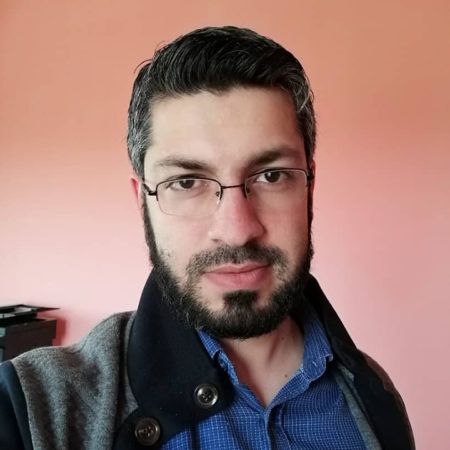
Ahmad has worked with GOAL for 8 years
“The level of destruction, terror, and fear we experienced in that period cannot be described in words,” he says. “Witnessing the homelessness, the poverty, the destitution, and the absence of the simplest provisions for many families motivates you to help people in any way you can, despite the dangers.”
His biggest fear was of going to work one day and not coming back home. “My deepest worry was that it was possible to die without having said goodbye to my father and mother,” he explains.
Ahmad decided to stay and continue his humanitarian work in Aleppo, but the city was getting too dangerous for his family. “It has been a strange story,” he says. “I was in one country, and my father, my mother and my sisters in another country, after they had to leave Aleppo for Turkey.”
Ahmad and his family have only seen each other four times in the last five years, for very brief periods. After border crossing points between northwest Syria and Turkey were closed for general movement, Ahmad was unable to visit, and had to say goodbye to his ailing father from afar when he died in 2019.
Abdullah, GOAL Syria Markets Programme Team Leader, says not knowing whether his parents and home were safe after each escalation in conflict was difficult. Equally his family members were often worried, waiting to hear that he too was safe.
“Working under conditions of shelling, displacement, and living with the fear of losing the people who are close to you at any moment is very difficult. There were times we went to work not knowing whether we would come back or not,” he notes.
“One of the toughest tests I’ve ever faced”
Mahmoud (28) is a father of two young boys, aged two and four. As GOAL Syria’s Partner Monitoring Team Leader in Idleb, he engages with local aid organisations on a daily basis to oversee the delivery of humanitarian assistance. His experience in the field has taught him a lot about the difficulties displaced communities live through, and their aspirations.
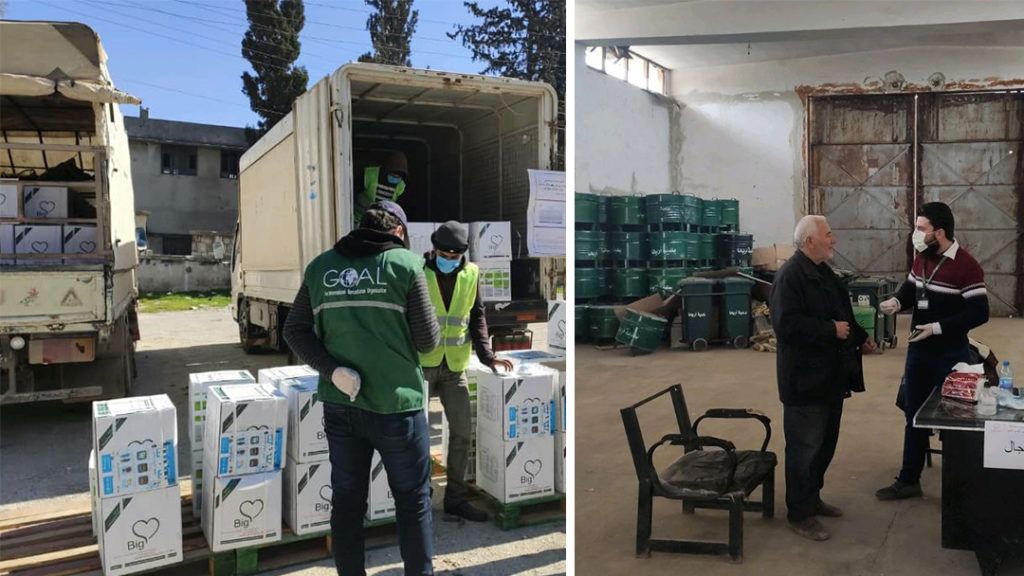
Mahmoud monitoring aid kit transportation in Syria
“Stories of displacement and asylum are stories about ambition, hope, fear, anticipation, achievement, sacrifice, and perseverance… all at once,” he says.
Yet Mahmoud’s own experience of displacement also reflects the difficulties conflict-affected communities in Syria have endured throughout the past decade. He was forced to move across Idleb province at least 14 times in the last 10 years. His latest experience of displacement was only last year.
“Every time, I told myself that this would be the last time. Each move is an episode in the story of ‘Displacement and Pain’ in which I and millions of other Syrians are merely the performers,” he says.
“The challenges I faced have grown as the number of displacements increased,” explains Mahmoud. “Having to find a new place to live that is relatively safe, securing a house, going back to transport your remaining belongings, adapting to a new environment… And of course, the continuous longing for your homeland and for your family, the feeling of loss of control over life… It has been one of the toughest tests I have ever endured,” he adds.
Iman (28) works in northern Aleppo as Deputy Manager in GOAL Syria’s Verification Department. She says her experience of displacement is best summed up in an old proverb: “The truth of me is like a tree which has been transplanted, and is now indecisive between the reluctance of its roots in the ground and the prospect of withering.”
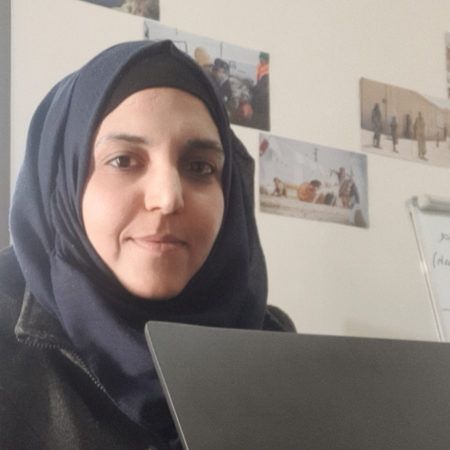
Iman at her desk in Aleppo
Iman has had to move more than seven times in the last six years. She was forced to leave her home in the northern countryside of Hama in 2015, soon after graduating university. Since then, she has lived both in the displacement camps in Qah and Atmeh, near Syria’s western border with Turkey, and within the host communities of Sarmada and Harem in Idleb.
For many Syrians, the hardship of displacement has been compounded by grief. Losing loved ones has at times driven Iman to the edge of despair – “it always felt as if all those who left took a part of my soul with them in their absence,” she says.
“I went through periods of feeling weak, to the point of surrender, but what made me go on was the positive impact we have sought to achieve, starting with our own families, and with the vulnerable groups that we reach out to in our work.”
“Humanitarian work is giving, bonding and trying to leave a beautiful mark in the midst of an ugly reality”
“Every day, in our work in the field, we touch the suffering of people living in the tents. Despite all the horrors, we remained here because of our commitments… Because we have so many dreams when we witness even the slightest signs of life, here.”
But there is hope for the future.
Ahmad says he finds optimism in the GOAL Syria Programme office environment. “Meeting many friends and colleagues from different regions, with diverse cultural backgrounds, has been very good for me,” he explains. “It is uplifting to witness the solidarity in providing assistance when needed, even outside of working hours, after an emergency or when our communities receive displaced families.”
Abdullah remembers a visiting to a GOAL beneficiary family in Harem several years ago that left a deep impression on him. “When the head of the household came out and saw the green badges on our chests, he started cheering for GOAL,” he explains.
In the early years of the conflict, soon after GOAL began its humanitarian operations in Syria in 2013, a missile landed near a GOAL car carrying two staff members who were returning from an emergency response aid delivery in Maaret Misren town in Idleb. Abdullah received serious injuries and was transferred to Turkey for treatment.
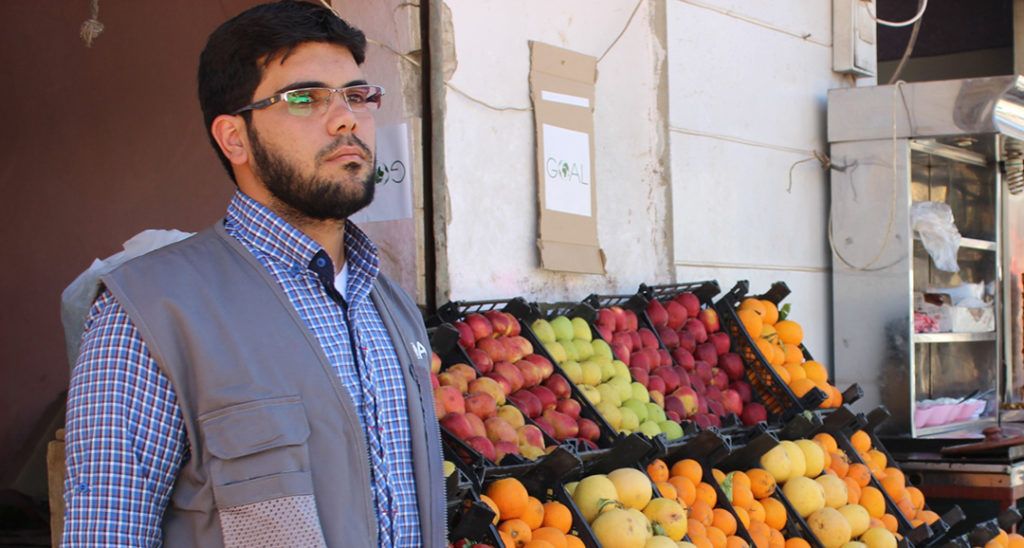
Abdullah visiting vendors participating in GOAL’s voucher programme
“The presence of my family of GOAL colleagues made things much easier. They were with me the whole time, through my journey to Turkey and while I was transferred from one clinic to another and finally to a hospital in Adana city. They accompanied me until I regained my health,” Abdullah remembers.
Safety and security concerns are only a small part of the worries of a humanitarian worker in Northwest Syria, however. The burden of not being able to deliver assistance to all families who may be in need can weigh heavily, too.
As a deputy manager in GOAL Syria’s Verification Department, Iman sees up close the hardship people in Idleb and northern Aleppo go through every day just to survive. “Virtually everyone in Northwest Syria lives below the poverty line and is in need. It’s devasting when we have to inform poor families that we cannot meet their needs,” she explains.
“I hope that security and stability will prevail in my beloved country”
GOAL’s support programmes in Idleb and northern Aleppo keep Ahmad, Abdullah, Iman, and Mahmoud very busy. Like millions of Syrians, they have been through countless challenges, and the long-term effects of experiencing violence, loss, and displacement continue to play a big part in their lives. “The suffering we are experiencing from constant mobility, and the perpetual fear of new displacement, has created a permanent state of instability. It is hard to forget. We need a lot of time to recover from it,” explains Ahmad.
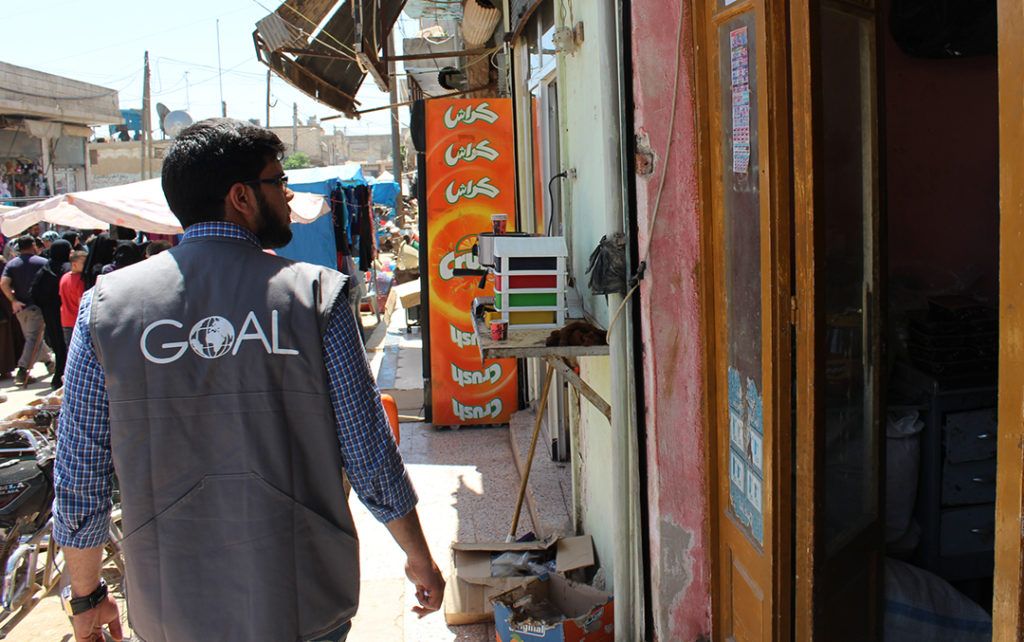
Abdullah visiting vendors in Idleb
Ahmad does not let the challenges prevent him from delivering assistance to those in need, however. The Logistics Officer had a significant role in GOAL’s expansion of humanitarian operations to northern Aleppo in 2018.
“I was present at the launch of the new office; we started out with a very small team and with limited resources. But the experience I have gained in the past years and my sense of duty as a humanitarian worker has helped me. We worked long hours but we were always trying to make sure that humanitarian aid reached the people in need.”
This sense of duty was also what led Abdullah to return to Syria after his recovery in a hospital in Turkey. “My passion to pursue my humanitarian work in my country, my longing for my relatives, friends and my GOAL Syria family, meant that I could not stay in Turkey.”
Mahmoud adds: “I have lived and worked inside Syria, as a citizen and a humanitarian worker. I experienced displacement and felt its cruelty and pain. Yet migration is also an expression of human aspirations for dignity, safety, and the future.”
“Our personal dreams pale in comparison to our wishes for the Syrian people”
In addition to their humanitarian work, Mahmoud and Iman are also academics who have studied towards post-graduate degrees. “My personal hope is to complete my studies,” Iman says. “But I know I am going to stay in Syria afterwards.”
“Yet all of our personal dreams pale in comparison to our wishes for the Syrian people to have stability, and lead a decent and secure life,” she adds.
For Mahmoud, too, humanitarianism has become a life-long endeavor, as well as a source of stability. “As a humanitarian worker, I am a figure who forms the basis of trust. This comes from a conviction that each human being has absolutely equal value – from a belief in human dignity, in human rights, regardless of the differences, occupations, and diversity of people, whether in race, gender, culture, language, religion, creed, or opinion,” he says.
Donate now to support GOAL’s humanitarian work.
